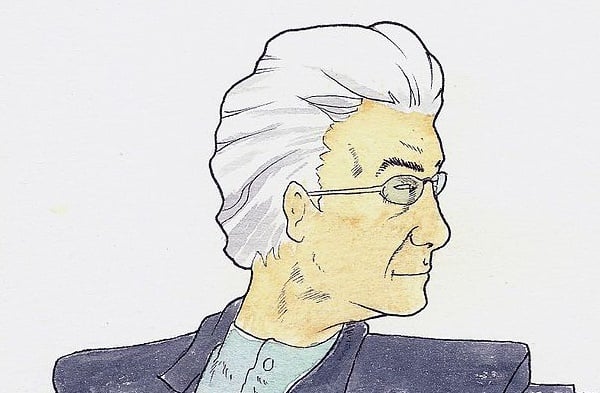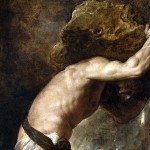
It is the right time to unveil this bombshell on the day when one of the 20th century’s most influential thinkers, Jacques Lacan, was born 115 years ago.
He relaunched psychoanalysis in the 1950’s with his seminars on Freud. His thinking is background behind all the leading postmodernist writers such as Jacques Derrida and Julia Kristeva (see the links for my posts about them).
You might remember Jacques Lacan’s Ecrits from your graduate studies. They were pretty much mandatory and, without a doubt, unreadable. Despite the latter, they somehow were very influential.
There’s a story Slavoj Zizek likes to tell of Paul Ricoeur attending one of Lacan’s seminars on Freud. Lacan invited Ricoeur to the seminar because the latter had written a great, big, and respected interpretation of Freud’s works, Freud and Philosophy: An Essay on Interpretation. Lacan, being the great egotist that he was, called up Ricoeur afterwards. He asked Ricoeur whether he liked the seminar. Ricoeur said he didn’t understand a damn thing. Lacan hung up.
I reckon Lacan’s strong connection with Catholicism was most likely missing in your professor’s take upon the postmodernist master of psychoanalysis. He once said, “I am the product of priests.” Even his brother was a priest.
This lacuna in the uptake of his writings was recently filled with the publication of his interviews and lectures about religion. The slim volume’s title is, and I bet you never say this coming in grad school, The Triumph of Religion.
In one part of the book Lacan starts out by downplaying the possibility of psychoanalysis becoming a religion, because it is merely a symptom of our deep discontent with modern civilization:
Mme Y. – Psychoanalysis is going to become a religion?
J. Lacan – Psychoanalysis? No. At least I hope not. But who knows, it might end up becoming in effect a religion, why not after all? But this is not the tack I think I am trying to take. I believe psychoanalysis did not arrive on the scene at just any historical moment.
It emerged after a capital step was taken, a key advance in the discourse of science. Analysis arrived – I am going to tell you what I am saying in my little report I thought up for this Conference – psychoanalysis is a symptom. Only the important thing is to know what it is a symptom of. But still it clearly is one, as Freud himself said, (when he used the words “Civilization and its Discontents“) – psychoanalysis is part and parcel of this discontent in civilization. So the most likely outcome is that people will not rest content with this vague knowledge that the symptom is the most Real thing there is. Instead all kinds of meaning will be spewed out here, there and wherever you please, and this will end up nourishing not only the true religion but a ton of false ones too.
Then comes the surprising clarifying note about Catholicism where he takes down false religions and the academic discipline of comparative religion:
Mme Y. – What does “the true religion” mean?
J. Lacan – The Roman religion is the true one. Just try putting all the religions into one bag and then make for example what is called a history of religions. It’s truly horrific. There is only one true religion, and that religion is Christian. The only thing is to know whether this truth will hold on, whether it will end up able to actually drown us in the meanings spews forth. I’m sure it will be able to because it does have resources. Lots of things are ready-made for these purposes. It will interpret the Book of Revelations. A lot of people have already taken a stab at it. It will unearth correlations between everything. This is its function in fact.
The analyst on the other hand is another thing entirely. He inhabits a kind of coming-of-age moment. For a short period of time, we caught sight of what the intrusion of the Real really is. The analyst remains tied to this point. He is there like a symptom and can only endure as a symptom. But you shall see, the day will come when humanity will be cured of psychoanalysis. This symptom will eventually be repressed by dint of its being drowned in meaning, religious meaning of course.
Note how much of his (jealous? envious?) opinion rests on the almost perverse ability of the Catholic imagination to saturate everything with meaning.
Did that register? If not, Lacan tacked the following question onto the above:
Do you get it? Has some small corner of your faculty of judgment been enlightened? Does this position of mine seem immoderate to you?
Boom!
I’m not sure if any of this actually translated into religious practice. A friend of mine recalls a story he heard from a Franciscan who had the unfortunate task of setting up living arrangements for Lacan at the Catholic University in Leuven.
This Franciscan was asked by Lacan whether the room was “furnished.” The Franciscan replied with, only thinking of the furniture, “Yes, it is furnished.”
Lacan looked around and saw no sign of a prostitute. He repeated the question, “Is this room furnished?” I believe arrangements had to be made.
Lacan wouldn’t be the first bad Catholic among first-rate thinkers, I guess. And my readers mostly aren’t Protestant prudes, so they won’t get too outraged by this.
For more on Lacan and theology see Alexandre Leupin’s Lacan Today: Psychoanalysis, Science, Religion and Tina Beattie’s Theology after Postmodernity: Divining the Void–A Lacanian Reading of Thomas Aquinas.
If you want to read about another Bad Catholic, then check out my piece on Heidegger.
Please also consider making a donation to this blog through the donation button on the upper right side of its homepage.
Stay in touch! Like Cosmos the in Lost on Facebook:












